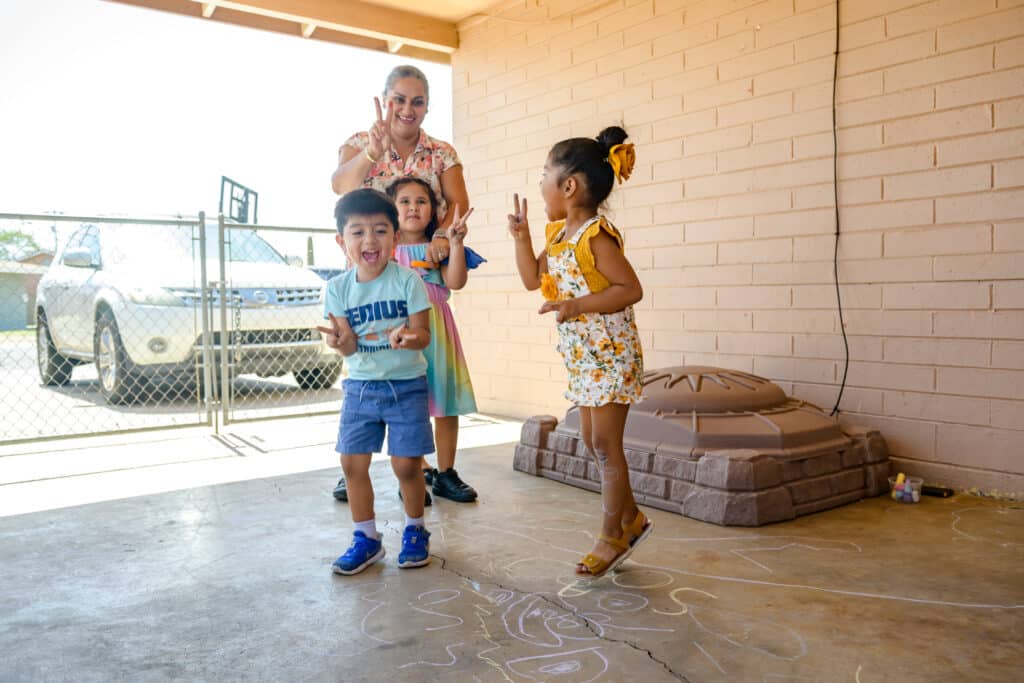“This Month Is an Opportunity for Recognition”
In honor of Hispanic Heritage Month, we share the stories of two child care providers who discovered their passion for organizing and community work.
In the United States, immigrant stories can start differently but eventually resemble each other. Leticia Barcenas and Claudia Valentín live in diagonally opposite corners of the country—Portland, Oregon, and New Orleans, Louisiana, respectively—they come from different countries—Mexico and Honduras—and began their American Dream with different plans—Leticia wanted to work to make money and support her family; Claudia looked for ways to educate young people in the diaspora—but they eventually discovered that their destiny was inevitably tied to the success of child care in their communities.
Their stories reflect the fighting spirit and solidarity that have always characterized Hispanics in the United States and the complexity of a term that encompasses many cultures and identities.
Dreams Material and Immaterial
Leticia arrived in the United States twenty years ago. “I started wrapping cutlery in the kitchen of a restaurant,” she says. Mexican, originally from the state of Guanajuato, she still remembers the initial impetus that every new immigrant feels in the country: working long hours, earning as much money as possible to be able to support her children and send some to her family in Mexico, seeking material stability for herself and her family. “When you first arrive, you feel like you want to take on the world and earn money; all dreams are material, and we neglect the immaterial dreams.” So much work left no time for the family. “I would go to work and leave my oldest son with a neighbor, a friend, whoever was available to look after him, for very little money. I didn’t know the value of that care.”
When the family grew, and after going through a health scare that sent her to the hospital, Leticia realized that it was time to stop working and instead dedicate time to her family and herself. “We already had three children, and I wanted to see them grow, especially the youngest.” Her husband supported her, but the family’s financial situation soon worsened. Almost by chance, a friend asked Leticia if she could care for her three children during the day, which she accepted. Without realizing it, she entered a new and complex world where she would become a local leader: home-based child care.
Leticia’s friend suggested that she visit a local nonprofit called Community Action to learn about additional resources available for child care providers in her community. “I arrived there and found many women discussing business, growth, education, and learning. Then, the lead teacher came in. When I listened to them talking about their experiences and achievements, I said this is for me. I want to continue studying and learning. The United States is not only a place to come and grow financially but also a place where you can grow professionally. That’s when my perspective on early childhood education opened up: it is not just about looking after children, but also about helping them develop.”
Today, Leticia works as a registered family child care provider with her husband in their home in Beaverton, a city near Portland. She also organizes in her community to advocate for and train child care providers in Oregon, where there is still much work to be done despite the progress achieved in the sector. “I always advocate for grants to consider us, registered families, and another type of caregivers called exempt from licensing.” Part of this work includes organizations like Home Grown.
“Talking about Hispanic Heritage is talking about the humility and connection we have as a community. It’s about how we live together and celebrate, but we also pay tribute to a community’s resilience. It’s paying tribute to our community leaders, business leaders, athletes, etc. It’s talking about how we fight to achieve something. The [non-Hispanic] people who live with us admire and empathize when they see us go through this process. This month is an opportunity for recognition.”
Hispanic and Afro-Latino Culture
Claudia is Honduran and Garifuna. “The Garifuna are from the island of Saint Vincent, east of England, and have been present in Honduras for 227 years,” she explains. “I was born and raised in Honduras. We are Hispanic, but we have our own mother tongue and our own culture. We can even say our own independence, which we celebrate on April 12, while the independence of Honduras is celebrated on September 15. We, as Garifuna, came to Honduras and have adopted the Honduran culture without forgetting our roots.”
So, upon arriving in New Orleans five years ago and finding a significant Garifuna community, she created an organization to offer educational programs to young people in the diaspora. Her work had to expand with the pandemic in 2020. “With Covid, we started giving out food, diapers, helping people, but then a colleague suggested we start supporting children.”
The idea made sense, especially for mothers who worked as housekeepers in the hospitality industry in New Orleans, one of the main drivers of the local economy, where even a well-paid housekeeper cannot cover the high child care costs. “So we told these mothers that they could leave their children with us, and they don’t have to pay, but they have to volunteer one of their days off.” This program began a new chapter for Claudia, in which child care has a central place in her mission to support her community. “I focus on getting children educated and getting mothers training to generate additional income. Child care is an integral part of making that happen.”
Claudia continues to offer child care through her organization today, but the program always faces financial challenges. Working with Home Grown has greatly supported her initiatives, which has also given her time to support families in other ways, from serving as a translator and counselor at schools to helping with rental housing paperwork.
Garifuna, Honduran, American. This is what Hispanic Heritage Month recognizes. “I was at a Hispanic festival here in New Orleans, and there was everything; it made me say, wow, our culture is so beautiful,” Claudia reflects.



